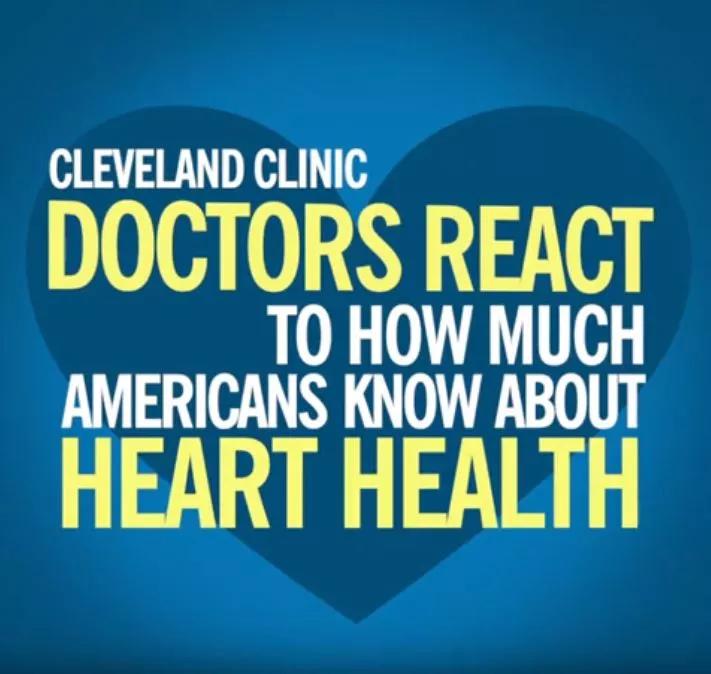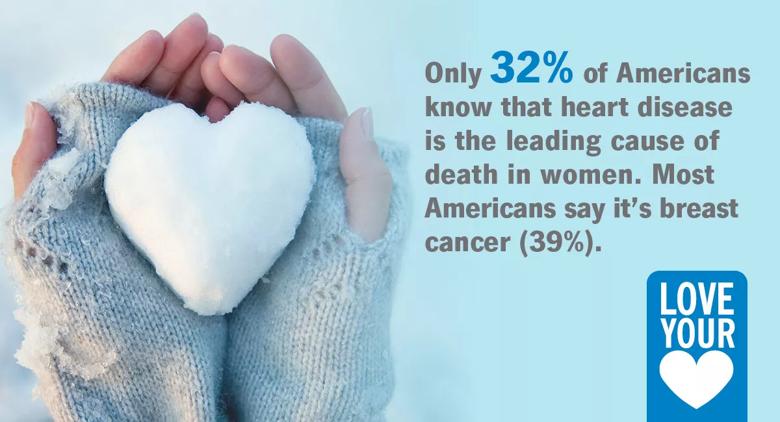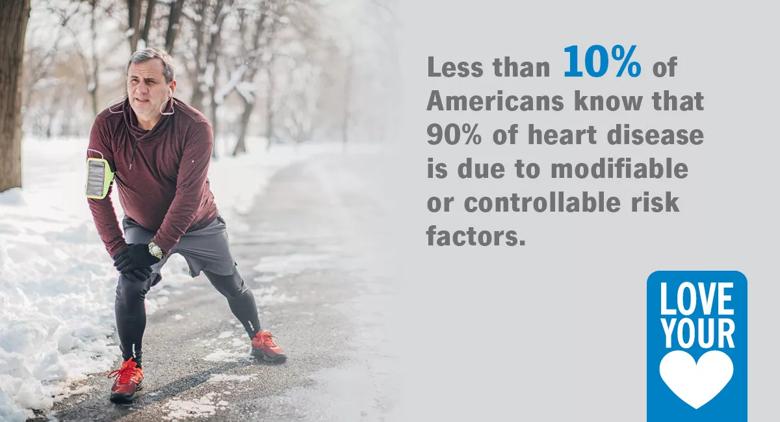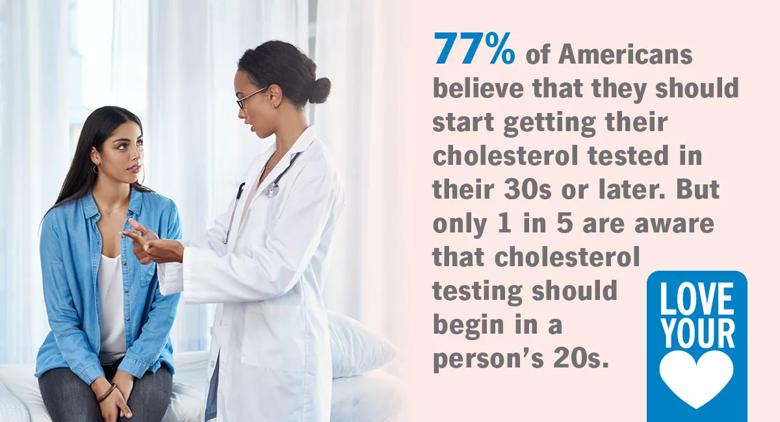Survey finds Americans underestimate the threat of heart disease, don’t understand most risk factors are controllable
Content is property of Cleveland Clinic and for news media use only.

A Cleveland Clinic survey finds that although heart disease is the leading cause of death in the United States, 68% of Americans do not know it’s the foremost killer of women.

Image content: This image is available to view online.
View image online (https://assets.clevelandclinic.org/transform/25cd5417-b4dd-45bb-90a6-7cebf73045df/love-your-heart-logo_jpg)
According to the survey, many Americans incorrectly thought breast cancer was the leading cause of death in women, with men especially likely to think this (44% vs. 33%). Among Millennials, 80% could not identify heart disease as the leading cause of death in women. Heart disease accounts for one in every four deaths in the U.S.
The survey also found that many Americans didn’t recognize key symptoms of heart attacks in women. Many do not know that chest pain (24%), shortness of breath or sweating (28%), pain in the neck or back of jaw (43%), new or dramatic fatigue (55%) and nausea/ vomiting (60%) are signs of a heart attack in females.
Americans also don’t recognize that most heart disease is preventable – for both men and women. Even though 90% of heart disease is due to modifiable/controllable risk factors, only 8% of Americans know that.

Image content: This image is available to view online.
View image online (https://assets.clevelandclinic.org/transform/639f9f74-8013-4920-b28b-c604089f74b1/heart-month-2020-social-vid_jpg)
Click on the image to see what Cleveland Clinic heart experts think Americans should know about heart disease.
The survey found there’s also a lot of confusion on what steps to take to prevent heart disease – and when. The survey found that:
“Treatment of heart disease has come a long way in the past few decades, but we still need to work on prevention,” said Samir Kapadia, M.D., chairman of Cardiovascular Medicine at Cleveland Clinic. “There are so many simple changes that patients and the public can make that can provide significant improvements to their cardiovascular health.

Image content: This image is available to view online.
View image online (https://assets.clevelandclinic.org/transform/afa11558-9517-4a13-b8aa-49838facc4c6/Kapadia-Samir-032-scaled_jpg)
Samir Kapadia, M.D.
“Whether it be regarding diet, exercise or other lifestyle factors, we need to continue to educate people about how to take control of their heart health.”
Additional survey findings include:
The survey was conducted as part of Cleveland Clinic Heart, Vascular & Thoracic Institute’s “Love your Heart” consumer education campaign in celebration of American Heart Month. Cleveland Clinic has been ranked the No. 1 hospital in the country for cardiology and cardiac surgery for 25 years in a row by US News & World Report.
For more information, go to:clevelandclinic.org/loveyourheart

Image content: This image is available to view online.
View image online (https://assets.clevelandclinic.org/transform/195a40f8-4a50-435b-940f-7ef8b1a803a8/20-CCC-1016-Love-Your-Heart-Social-Stream-1_jpg)

Image content: This image is available to view online.
View image online (https://assets.clevelandclinic.org/transform/e205e675-2279-49c8-92a1-efcbacd11ac7/0-CCC-1016-Love-Your-Heart-Social-Stream-11_jpg)
Video content: This video is available to watch online.
View video online (https://www.youtube.com/embed/YNYcKjEfdFM?feature=oembed&wmode=transparent)
Few Americans Know Heart Disease Is Leading Cause of Death in Women | Cleveland Clinic

Image content: This image is available to view online.
View image online (https://assets.clevelandclinic.org/transform/080c6be1-7b0e-4263-aa00-df15963a4c0c/0-CCC-1016-Love-Your-Heart-Social-Stream-21_jpg)

Image content: This image is available to view online.
View image online (https://assets.clevelandclinic.org/transform/d4e54875-00ed-46ff-b200-770f8a56dddf/0-CCC-1016-Love-Your-Heart-Social-Stream-6_jpg)

Image content: This image is available to view online.
View image online (https://assets.clevelandclinic.org/transform/9a039836-2ec3-4894-8db6-a647fc7b2e4d/0-CCC-1016-Love-Your-Heart-Social-Stream-16_jpg)

Image content: This image is available to view online.
View image online (https://assets.clevelandclinic.org/transform/25cd5417-b4dd-45bb-90a6-7cebf73045df/love-your-heart-logo_jpg)
Methodology
Cleveland Clinic’s survey of the general population gathered insights into Americans’ perceptions of heart health and prevention. This was an online survey conducted among a national probability sample consisting of 1,000 adults 18 years of age and older, living in the continental United States. The total sample data is nationally representative based on age, gender, ethnicity and educational attainment census data. The online survey was conducted by Dynata and completed between September 23 and September 26, 2018. The margin of error for the total sample at the 95% confidence level is +/- 3.1 percentage points.
Cleveland Clinic is a nonprofit multispecialty academic medical center that integrates clinical and hospital care with research and education. Located in Cleveland, Ohio, it was founded in 1921 by four renowned physicians with a vision of providing outstanding patient care based upon the principles of cooperation, compassion and innovation. Cleveland Clinic has pioneered many medical breakthroughs, including coronary artery bypass surgery and the first face transplant in the United States. Cleveland Clinic is consistently recognized in the U.S. and throughout the world for its expertise and care. Among Cleveland Clinic’s 82,600 employees worldwide are more than 5,786 salaried physicians and researchers, and 20,700 registered nurses and advanced practice providers, representing 140 medical specialties and subspecialties. Cleveland Clinic is a 6,728-bed health system that includes a 173-acre main campus near downtown Cleveland, 23 hospitals, 280 outpatient facilities, including locations in northeast Ohio; Florida; Las Vegas, Nevada; Toronto, Canada; Abu Dhabi, UAE; and London, England. In 2024, there were 15.7 million outpatient encounters, 333,000 hospital admissions and observations, and 320,000 surgeries and procedures throughout Cleveland Clinic’s health system. Patients came for treatment from every state and 112 countries. Visit us at clevelandclinic.org. Follow us at x.com/CleClinicNews. News and resources are available at newsroom.clevelandclinic.org.
Editor’s Note: Cleveland Clinic News Service is available to provide broadcast-quality interviews and B-roll upon request.